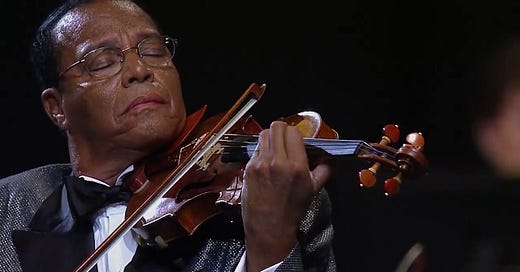“Saying It Loud: 1966 — The Year Black Power Challenged The Civil Rights Movement” by Mark Whitaker is a book I’m currently reading with rapt attention. In chapter 5 entitled “The Black Panthers of Lowndes County,” Whitaker begins by exploring the death of Adolphus Carmichael, the father of revolutionary civil rights activist Stokely Carmichael. In this book passage, he notes a very interesting sidebar about the elder Carmichael:
“….the few times father and son got to spend leisure time together were etched in Stokely memory. He could recall the phonograph records that he found Adolphus listening to in his rare moments of relaxation. His father’s favorites were crooner Nat King Cole and Louis X, the witty calypso singer named “the Charmer” who later earned a very different reputation as Nation of Islam leader Louis Farrakhan.”
It was this last sentence that led me down the rabbit hole in search of some background on this inflection point in Farrakhan’s life. As you may know, Farrakhan has been a very controversial figure for years beginning with outside assertions that he was the mastermind behind Malcolm X’s assasination in 1965. He had joined Nation of Islam, a Black organization rooted in American Islam and black nationalism ten years prior, becoming Malcolm’s assistant. As NOI’s leader since 1978, he has made a multitude of controversial anti-Semitic and anti -white statements as chronicled by the Anti-Defamation League.
Born Louis Eugene Walcott before Louis X and then Louis Farrakhan, he has an interesting genesis to his life story. Farrakhan was born in the Bronx to a Jamaican father and mother born in Saint Kitts. He has stated that his parents soon separated and that he never knew his biological father.
His mother later connected with a man named Louis Walcott from Barbados, who became his stepdad. After Walcott died in 1936, the family moved to Boston, Massachusetts in the West Indian neighborhood of Roxbury.
It was during those early formative years that Farrakhan began his journey as a pianist and violist. He received his first violin at 12, setting out on tour with the Boston College Orchestra. In the mid-forties, he became one of the first Black performers to appear on the Ted Mack Original Amateur Hour. The 1950s is when he found a degree of fame as a professional musician known as “The Charmer,” recording and mixing tunes with a mento/calypso style.
A pivotal moment came in February of 1955 when his friend and saxophonist Rodney Smith invited him to the Nation of Islam’s annual Saviours’ Day address by Elijah Muhammad. Shortly after his Farrakhan’s conversion, Muhammad stated that all NOI musicians had to choose between their music career or NOI. Because Farrakhan chose to remain with NOI, his professional music and dancing career ended.
In recent years, he has resurrected his love for the violin, performing at several high profile events. I attempted to try to locate some of his performances. This turned out to be an arduous process given that he has been banned from much of social media including YouTube. But if you are a Facebook user, you can access a clip here.
Otherwise, I was able to locate the video below from a few years ago. If you go to roughly 1:01:08 in the time mark , you will be blown away.




